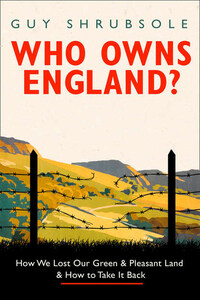William Collins
An imprint of HarperCollinsPublishers
1 London Bridge Street
London SE1 9GF
www.WilliamCollinsBooks.com
This eBook first published in Great Britain by William Collins in 2019
Copyright © Guy Shrubsole 2019
Cover images: Science & Society Picture Gallery / Getty
Guy Shrubsole asserts the moral right to be identified as the author of this work
A catalogue record for this book is available from the British Library
All rights reserved under International and Pan-American Copyright Conventions. By payment of the required fees, you have been granted the non-exclusive, non-transferable right to access and read the text of this e-book on-screen. No part of this text may be reproduced, transmitted, down-loaded, decompiled, reverse engineered, or stored in or introduced into any information storage and retrieval system, in any form or by any means, whether electronic or mechanical, now known or hereinafter invented, without the express written permission of HarperCollins
Source ISBN: 9780008321673
Ebook Edition © May 2019 ISBN: 9780008321697
Version: 2019-04-16
It’s often very difficult to find out who owns land in England. Land ownership remains our oldest, darkest, best-kept secret.
There’s a reason for that: concealing wealth is part and parcel of preserving it. It’s why big estates have high walls, why the law of trespass exists to keep prying commoners like you and me from seeing what the lord of the manor owns – and why the Government’s Land Registry, the official record of land ownership in England and Wales, remains a largely closed book. The geographer Doreen Massey once observed that the secrecy surrounding land ownership was ‘an indication of its political sensitivity’.
Owning land has unique benefits. The inherent scarcity of land means it’s almost always a solid bet for investment. ‘Buy land,’ quipped Mark Twain, ‘they’re not making it anymore.’ Own some land, particularly in a valuable location, and you’re pretty much guaranteed a steady stream of rental income from it – whether by leasing it out for farming, or building flats on it and charging tenants rent.
In fact, a landowner need not do anything to make a profit from their land. ‘Land … is by far the greatest of monopolies,’ raged Winston Churchill in a blistering polemic penned in 1909. Consider, wrote Churchill, ‘the enrichment which comes to the landlord who happens to own a plot of land on the outskirts or at the centre of one of our great cities’. The landowner need only wait while other people work and pay taxes to make the city grow more prosperous: building businesses, installing roads and railways, paying for schools and hospitals and public amenities. ‘All the while,’ Churchill growled, ‘the land monopolist has only to sit still and watch complacently his property multiplying in value, sometimes manifold, without either effort or contribution on his part; and that is justice!’
And that’s why land – and who owns it – lies at the heart of the housing crisis. It’s not because bricks and mortar have suddenly become incredibly expensive. It’s because the value of the land itself has gone through the roof. According to the Office for National Statistics, the value of land in the UK has increased fivefold since 1995. Landowners are laughing all the way to the bank: over half of the UK’s wealth is now locked up in land, dwarfing the amounts vested in savings.
Who owns land matters. How landowners use their land has implications for almost everything: where we build our homes, how we grow our food, how much space we leave for nature. After all, we’re not just facing a housing crisis. We’re also in the throes of an epoch-making environmental crisis, with our land scoured of species and natural habitats after decades of intensive farming. Our unsustainable food system is not only contributing to poor health; it also faces the biggest upheaval in generations thanks to Brexit. And all the while, our society has grown obscenely unequal, with wealth concentrated in the hands of a tiny few – including the ownership of land.
Politicians used to understand this. A century ago, the Liberal Chancellor of the Exchequer, Lloyd George, declared: ‘The land enters into everything … the food the people eat, the water they drink, the houses they dwell in, the industries upon which their livelihood depends. Yet most of the land is in the hands of the few.’ But today hardly any politicians even mention land in their speeches, let alone lift a finger to do anything about it.








